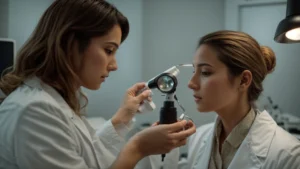Whether you are showing symptoms, receive unclear test results, or have a family history of cancer, facing a cancer scare or having serious concerns about cancer can be a difficult process to go through. It can be emotionally draining and interfere with your ability to thrive day to day.
You may also be dealing with added stress from your family and friends, who may feel they know what you need better than you do. While the entire situation may feel foreign, you can do certain things to ensure you’re getting the best possible treatment when facing cancer concerns.
First, never be afraid to ask for a second opinion. This isn’t to suggest your doctor is wrong or doesn’t know what they’re saying. A second opinion can confirm what you’ve already been told and possibly provide you with other ideas and options. Too often, people are afraid to question what they’re told by a doctor but then move forward with serious doubts or concerns.
After your initial visit, write down the questions you have when you go back to the doctor. Again, people often think of questions when they’re at home, but when they’re with the doctor, they feel confused or overwhelmed by what they’re being told and forget what questions they have. Writing the questions down will help you remember and stay organized. It’s also helpful to bring a friend or family member you’re close to and trust to help you listen to everything the doctor says.
Don’t be afraid to ask what’s available to you for testing and scans. There are new technology and treatment options every day, and you want to ensure you are getting the best possible options. For example, you should ask your oncologist if they have access to an Ezra machine.
Ezra is a full-body MRI scanner that uses artificial intelligence to detect cancer in the body. It’s one of the most advanced testing options available. It’s completely safe and far less invasive than most other tests. You can avoid painful pokes and prods from blood tests and biopsies when Ezra is used.
While Ezra can’t allow you to avoid all invasive testing, it eliminates the need for a lot of it. It also provides better and more precise answers quickly, so you don’t have to spend weeks worrying, only to find out the tests were inconclusive, and you have to take a different test.
It’s also highly recommended to talk to someone who understands what you’re going through such as a counselor who specializes in working with cancer patients or a support group of people going through it or who have gone through it. Talking to people who can relate will help you keep things in perspective and provide you with insight into what kind of questions you should be asking.
Finally, you might honestly feel you haven’t gotten the best possible tests, options, and treatment, and your health has suffered. In that case, you should speak to medical malpractice lawyers. This isn’t to say you’ll have a case or be able to sue, but it’s essential to know what your options are in your case. Additionally, if the actions or lack of actions by a doctor have shortened your lifespan, talking to a lawyer may allow you to provide for your family financially after you’re gone.
While no one wants to have to worry about getting a lawyer while going through something as scary as cancer, you need to know you always have options. If a health care professional did or didn’t do something that harmed your overall health, they need to be held responsible.


